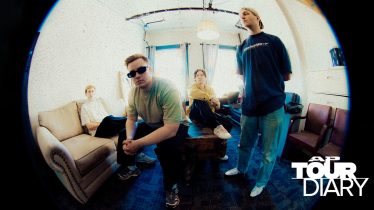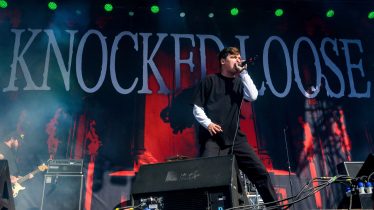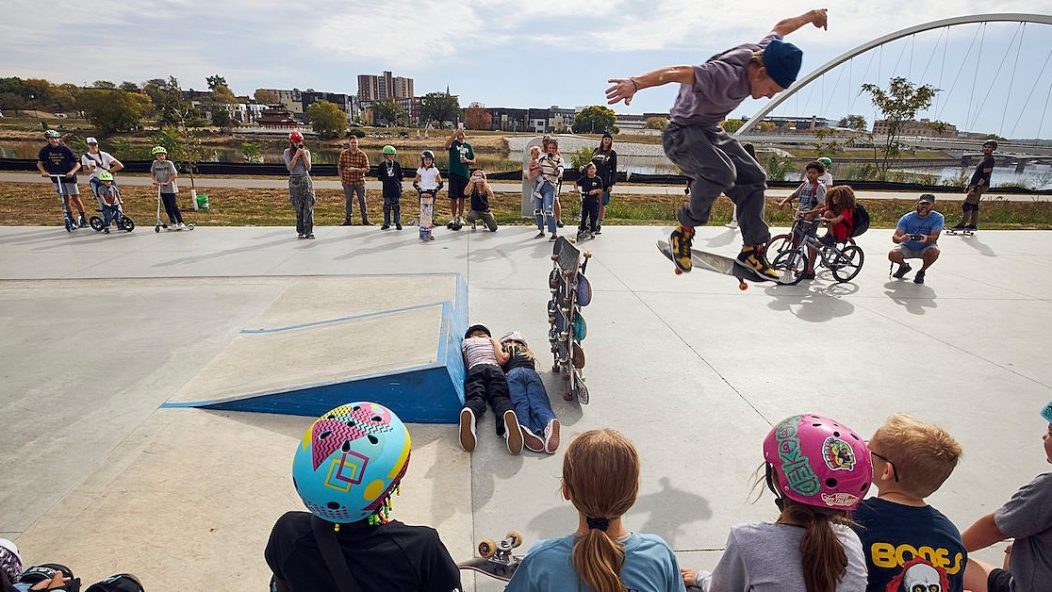
One of the coolest skateboarding scenes in the nation is unfolding in this Midwestern city
Welcome to Scene Report, where we highlight significant, underground scenes and subcultures across the globe.
In the 1989 classic Field of Dreams, Kevin Costner walks through a cornfield in Iowa and hears the whisper, “If you build it, he will come.” In response, he builds a baseball field in the middle of a corn field, drawing some unlikely visitors, just as the voice foretold. 30 years later, this whispered vision of Iowa and cornfields has more or less stuck in the cultural lexicon.
Thus, one of the most common responses when you tell someone you’re from Des Moines, Iowa, is: “Do you live in a cornfield?” The Iowa capital has long been considered one of those mid-size, Midwestern dark horse cities, where you get it if you live there, but wonder why anyone would live there if you don’t. However, this 20-minute city — meaning, you can get pretty much anywhere within a 20-minute drive — is now drawing visitors from all over the world and contributing to culture in an entirely new way.
Read more: How DENCITY is providing a safe space for women and queer skaters in Nigeria
More specifically, it’s drawing a plethora of skaters. Skateboarders are coming to the Midwest in droves, and Iowans themselves are feeling cooler than ever, because as of 2021, Des Moines is home to the largest public skatepark in the U.S., Lauridsen Skatepark. The cornfield has been replaced by a skatepark and the baseball players have been replaced by skaters, but the Iowan vision remains the same: if you build it, they will come.
Across the street from Wells Fargo Arena and across the Des Moines River from the golden state capital building, the new skatepark has shaped the geography of downtown Des Moines — as well as the community. Spanning 88,000 square feet, Lauridsen has provided a location for competitions like Dew Tour, a 2021 Olympic qualifier, and has become a hub for locals. It’s a place where hometown skateboarding crews like Subsect Kids come together and a place for seasoned skaters to connect and film videos.
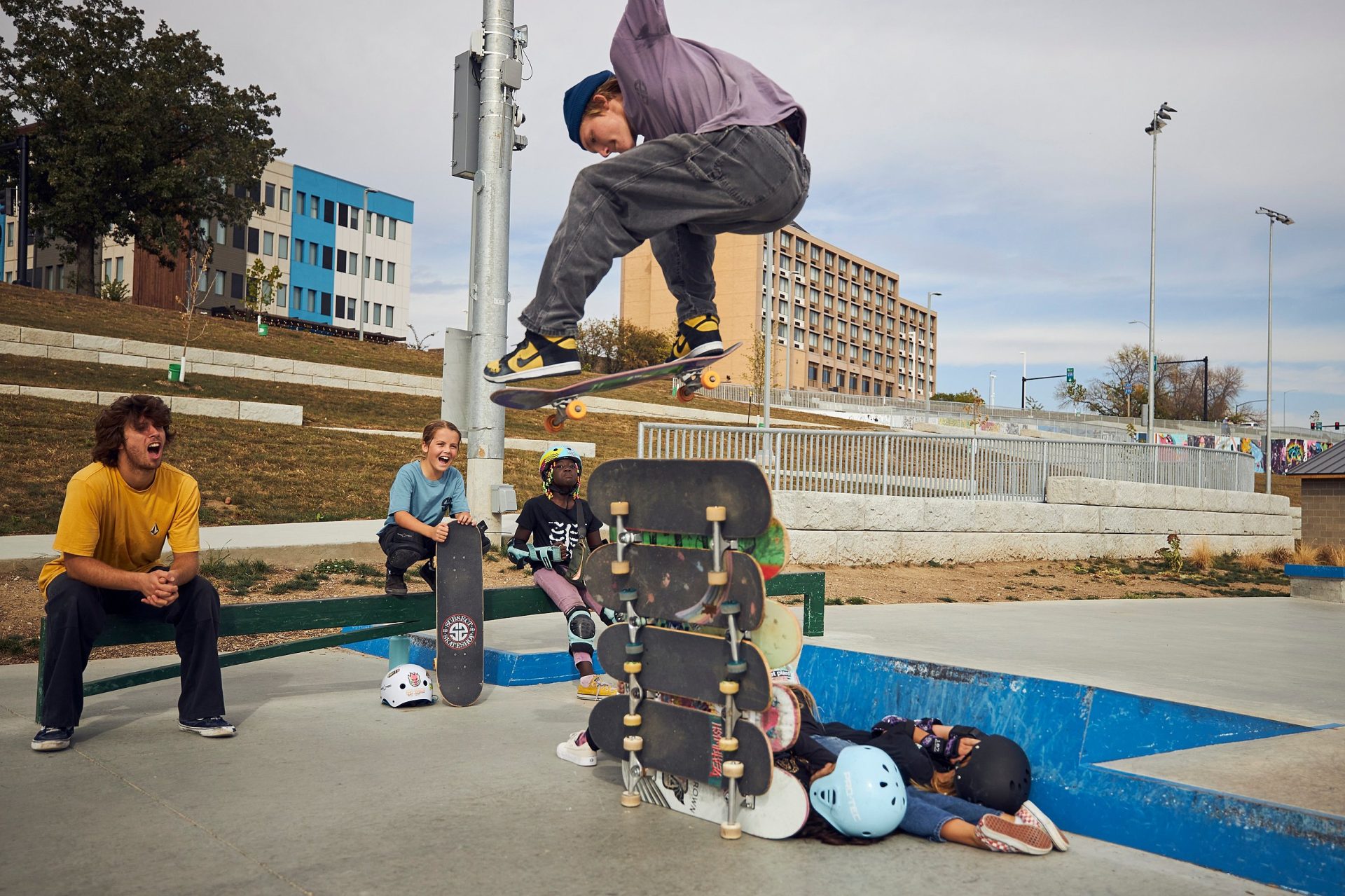
[Subsect Kids / Photo by Joe Crimmings]
In the same way the park changed the landscape of downtown, the people in the longstanding skateboarding community have irrevocably changed the culture of Des Moines. There are those across the counter at the East Village skate shop, the ones sliding down the Lauridsen bowl on a summer night, the ones holding children’s hands as they learn tricks for the very first time. Beyond the new park, what’s at the heart of the Des Moines skateboarding scene is the people.
Kevin Jones, the owner of a skate shop called Subsect, knows this. The Des Moines native explains that the exact reason he’s stayed there is because of “the people” and the growing skate scene (and the easy, 20-minute drives, of course).
Subsect sits in Des Moines’ East Village, across the river and just south of Lauridsen. meaning it’s a skate-able distance from the park. While the grandiose park is new, skateboarding found a home in Des Moines long before its arrival: Subsect has existed for 25 years and has been in this downtown location for over a decade. Jones has been involved with the shop since the beginning, but four years ago he and his wife took over the ownership. Like any skate shop, Subsect sells boards, wheels, shoes, apparel, stickers, and more. But what the shop is really providing is community. Subsect is a gathering place, a safe space, a spot to meet other skaters who enjoy the same thing. In fact, when a group of kids decided to form their own skateboarding group — their own collective to practice and learn how to skate together — they affectionately called it Subsect Kids.
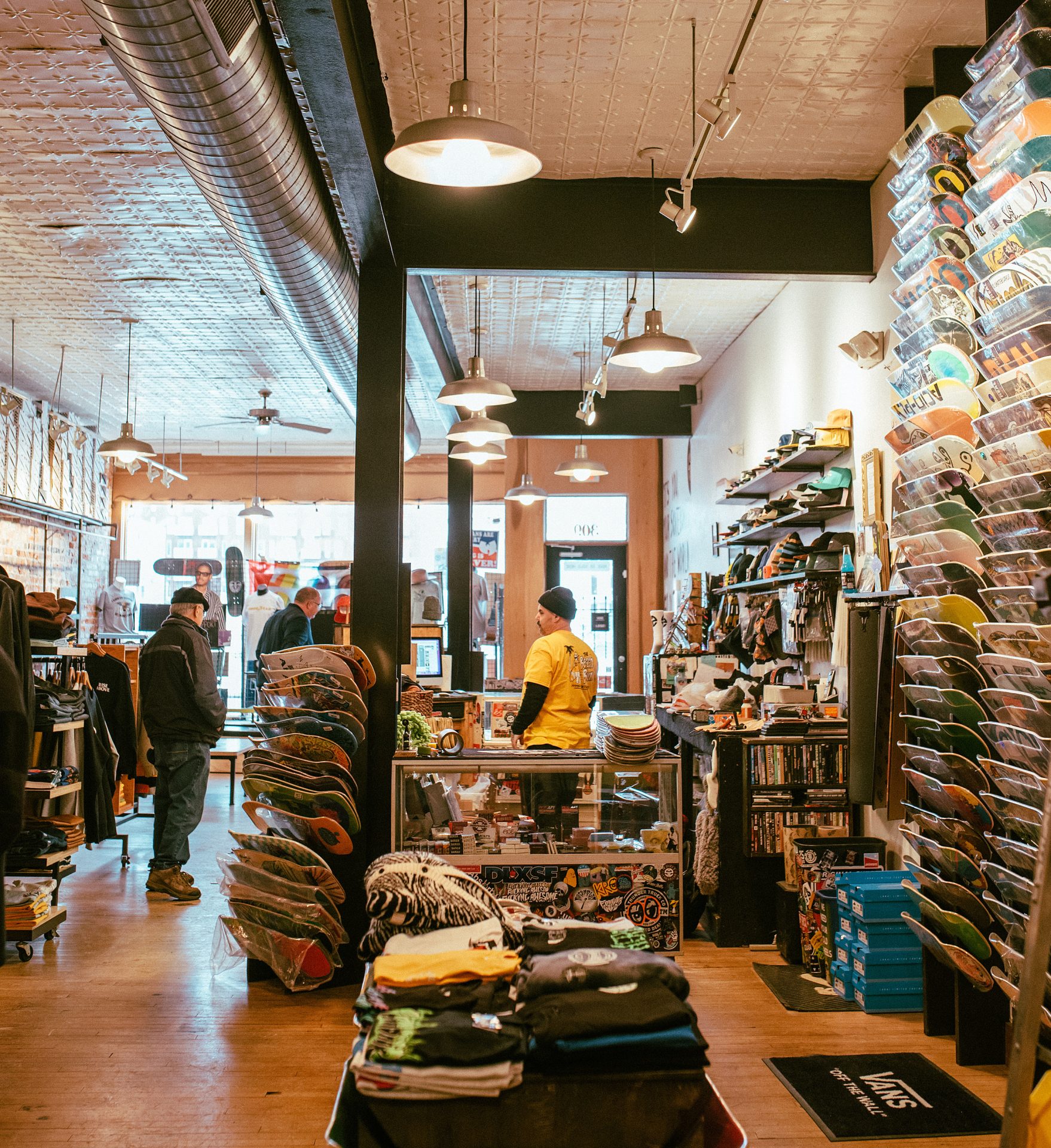
[Subsect / Photo by Estorie]
While skateboarding traditionally has felt unattainably cool, Subsect has created an approachable space that defies those stereotypes, and this sentiment is not isolated to the shop. Skateboarding’s history of being dominated by cis-men is being challenged by many in the overarching Des Moines scene who are working on changing that dynamic for the future.
Ana Caculovic, for instance, is a skater who’s been an integral part of the scene for years. She grew up skating with her three brothers at Des Moines’ older, smaller skate park, Walker Johnston. The now-25-year-old kept honing her skills, and prior to the pandemic, Ana was even touring the Midwest. Even so, Des Moines has been her homebase for the last 20 years. And just like Jones, she’s stayed in Des Moines and stuck with skateboarding.
To her, it’s unlike any other sport — or any other feeling, for that matter. She says, “With skateboarding, you don’t have a coach telling you, ‘Hey, go throw yourself down those set of stairs 50 times.’ It’s just a mental game. It’s just yourself and your board, and it feels so good when you do it.”
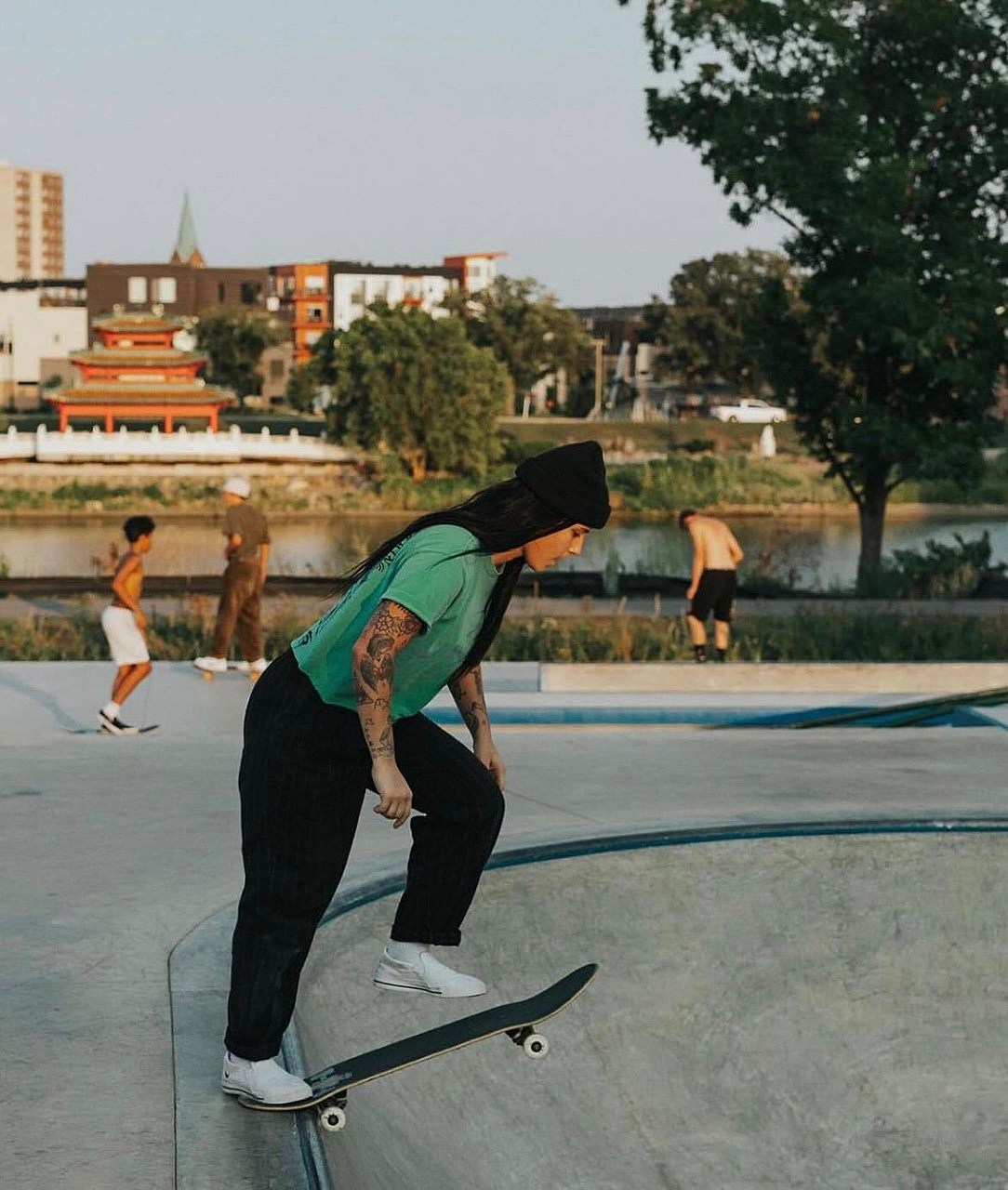
[Ana Caculovic / Photo by Ashley McLain]
The city reflects that energy. The growth of skating in Des Moines isn’t because an outside force declared it a strategic location. All the growth was because people inside the community saw the need and chose to push through. It wasn’t easy to get to this moment, though. While Ana had been waiting for the park since middle school, Kevin had been advocating for the space for 20 years. Though every few strides forward would be met with a political or logistical roadblock, he kept talking about the dream to anyone who would listen. After two decades of advocating, suddenly things shifted.
“I think what changed is guys my age that maybe skated and didn’t stick with it were now finally sitting in those meetings that we were asking for money,” Jones says. “All of a sudden, someone sitting on the other side of the table goes, ‘Well, I used to skate, I loved it, and look where I am now.’.” Eventually, the long-standing dream started becoming reality. By April 2018, 2.4 million dollars were raised and ground was broken in October 2018. By May 2021, the park was open.
The skatepark wasn’t the only change in Des Moines’ skateboarding community. About a decade ago when Caculovic began skating, there weren’t many other girls skating. Now, she’s no longer the only girl at the skatepark, and a new wave of young skaters have joined. “When these little kids see me now, they’re like, ‘You’re that girl! You’re Ana who skates!’” she says. “We’ve got the Subsect Kids skate crew [now] — those kids are rippers. When I was skating when I was 12, I didn’t have that.”
Subsect Kids is a weekly meetup that evolved out of a need for this sort of community. Alyssa Bowers, despite not being a skater herself, saw the need and started the group. Although her husband is a skater, her 8-year-old daughter wanted to learn on her own and was excited by the prospect of Lauridsen when it opened. Eventually, they started inviting other kids to join them without any plan to start a group — and now they meet every Thursday, Bowers explains. There’s not a skill level qualification to join and there’s not a formal teacher. Sometimes Jones or Caculovic or other more experienced skaters will show up and offer pointers, but often the kids simply try new tricks and learn together, teaching each other. Some weeks, as many as 30 kids between the ages of 5 and 13 show up. Just like Subsect, the Thursday morning space belongs to anyone who is willing to show up.
The Des Moines skateboarding community is good at this — creating spaces without qualification to show up and be and learn and grow. 23-year-old local skater and videographer Connor Barrett explains this, saying, “There’s enough people [in Des Moines] that’s it’s not a small town, but I go to the park and there’s not many people who aren’t like, ‘What’s up CB?’” In a city the size of Des Moines, you can slow down enough to be known by others in the community — and to learn how to get really fast at skating.
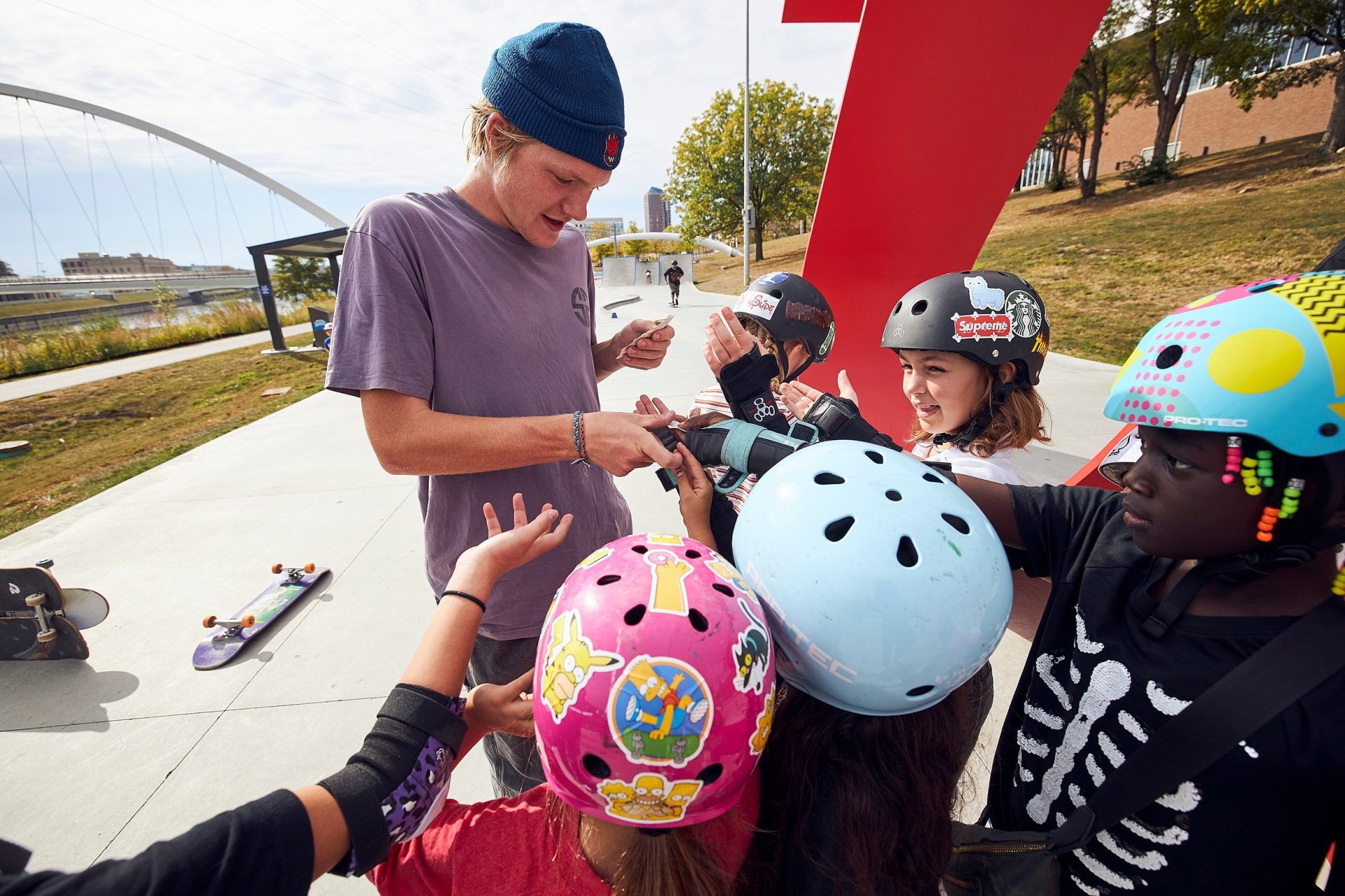
[Subsect Kids / Photo by Joe Crimmings]
Local non-profit Skate DSM is another group that has created safe spaces to learn and engage. While their two-fold purpose is to grow and support the skateboarding community, what they’re really doing is breaking down barriers to entry. After forming in late 2018, the group realized there was a need in the community that they could fulfill.
Skate DSM president Norm Sterzenbach explains, “There are places to take kids to teach them gymnastics and teams [to join], but when parents would come to the skateshop and buy their kid a skateboard, there wasn’t any place to take them. It’s not authentic to the history of skateboarding to have classes, but we knew that there needed to be some sort of middle ground to give kids an opportunity to try skateboarding in a safe environment, particularly with the new park.” Skate DSM began hosting clinics as an introduction to skateboarding for curious kids in the community to visit the skatepark, try it out, and meet other people. While Subsect Kids is a meetup, these clinics are structured more like classes, with specific learning goals, and taught by more advanced skaters, so when kids return to the park, they’re met with familiar faces.
Last year, Skate DSM also launched the Get On Board Project to help aspiring skaters who might not have the means get the proper equipment to skate. In 2022 alone, they donated 469 boards and helmets to kids across the Des Moines Metro area and have already received a grant to assist in continuing the mission in 2023.
That’s just one example of how the environment of the Des Moines skateboarding community is welcoming; while other skate scenes might feel cliquey or exclusionary, Des Moines is different. Barrett notices the difference, saying, “No one is like, ‘These people can’t [skate] here.’ We’ll all end up meshing.”
This collaborative environment has served him well, as he’s filmed a variety of skaters — many of whom ended up on his latest project, respecTapes. After shooting for a year and a half and going through four cameras, six fisheye lenses, and countless rolls of tape, he actually just premiered the film at an event at Subsect. Meaning, there’s space in the scene for collaboration and creating in multiple mediums, not just on a board.
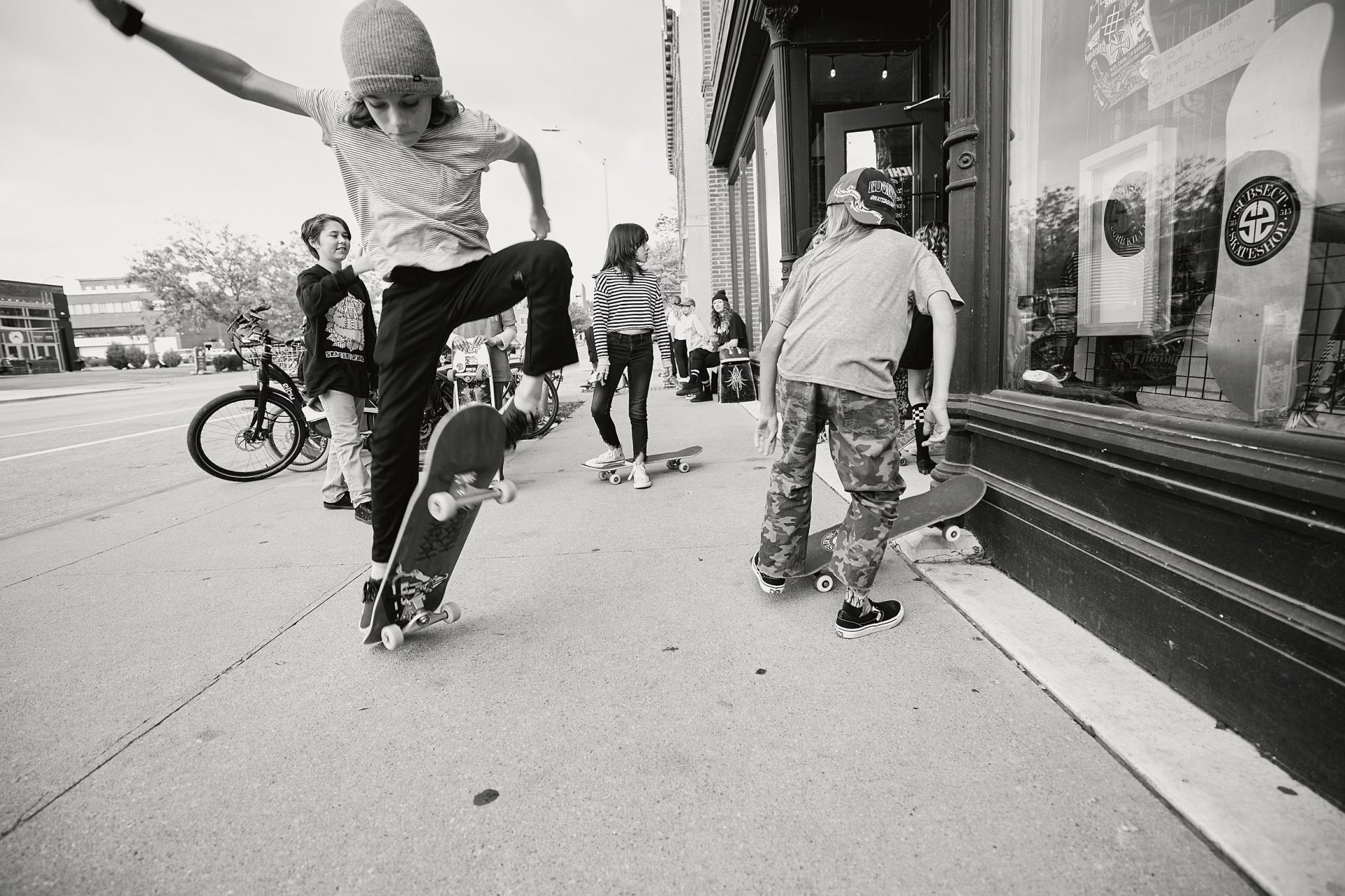
[Subsect Kids / Photo by Joe Crimmings]
Beyond collaboration and creation, the Des Moines skateboarding scene is also contributing to the larger community through the Des Moines Streetstyle Open, a competition founded by Skate DSM in 2021. It’s an open competition, meaning anyone can enter, and offers an opportunity for local skaters to compete alongside skaters from all over the region. Rather than being held solely at the skatepark, the two-and-a-half-day competition has locations all around the Des Moines metro area, encouraging visitors to not only skate, but explore the area and genuinely connect with each other.
“It’s a good scene,” Caculovic says. “In the skate community, nobody is tearing you down. Nobody is telling you, ‘You can’t do that.’ It’s just like all encouragement.” And despite touring the Midwest and experiencing other skate communities, she is always drawn back and still feels as if the Des Moines scene is “where I’m supposed to be.”
Three decades after Field of Dreams, Iowa is still building and drawing exciting people in. And now instead of being known for cornfields and baseball movies, Iowa is becoming known as a national skateboarding hub — one that’s home to filmmakers and skate shops, skate communities and non-profits, and, clearly, the next generation of skaters.

